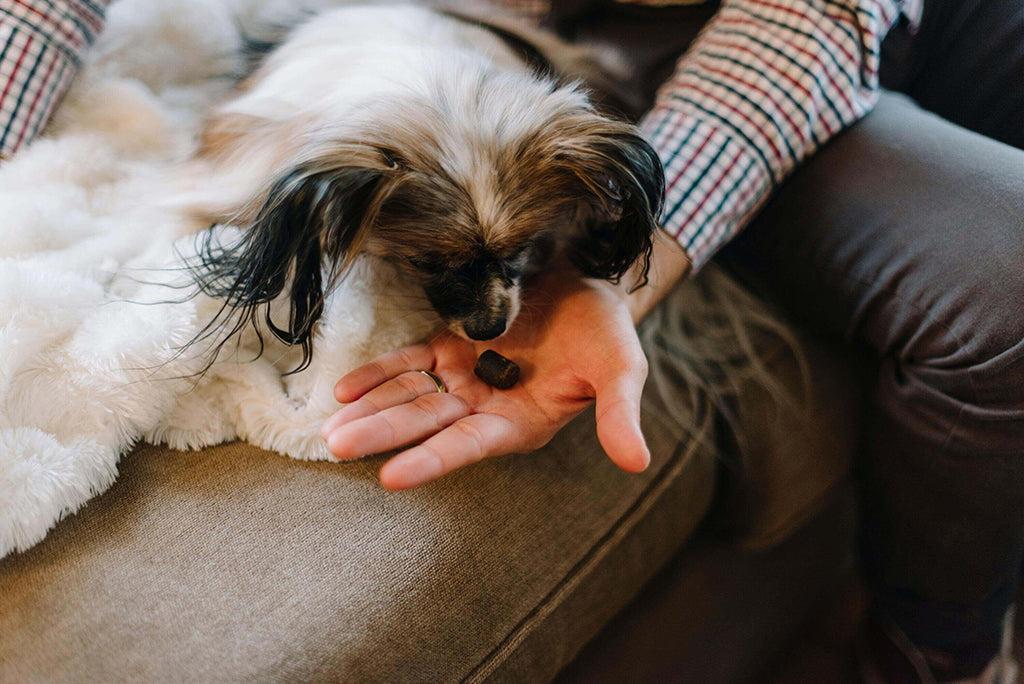“How to get my dog to gain weight?” In this blog, we learn how to help a dog gain some weight. We’ll explore how to tell if your dog is underweight, what to feed a dog to gain weight and how to properly help them on their weight gain journey.
- Home/
- Dog/
- Health & Wellness/
- Dog Won’t Gain Weight? Here’s What To Do
Dog Won’t Gain Weight? Here’s What To Do

Is My Dog Underweight?
Before you decide that your dog needs to gain weight, you need to be sure they’re under their optimum weight. So, let’s learn how to tell if a dog is underweight!
You may be able to notice that your dog is underweight just by looking at them, but there are signs to help you decide if they really need to be gaining weight. Different breeds are safe to carry varying amounts of body fat, so if you are unsure of the ideal weight for your pup, ask your vet for a weigh-in.
The first thing you can do is check to see if you can feel their ribs, pelvis, and spine. When stroking their stomach or back, you should be able to slightly feel their bones. If you feel the bones protruding through quite prominently, they could be underweight. If their bones are buried under the fat, it’s likely that they’re overweight.
Use our handy guide here to check to see if your dog is underweight…

Other signs you may spot if your dog is underweight include:
- A lackluster coat
- Seeming lethargic
Why Is My Dog Not Gaining Weight?
There are several reasons a dog could become underweight:
- They have an underlying condition (like Hyperthyroidism)
- They’re susceptible to occasional stress
Dogs can become stressed from things like:
– Local construction noise
– A schedule change (as they’re creatures of habit)
– Being interacted with too much
– Another animal has arrived on their territory
– Because they’re being abused or experiencing punitive training from someone in their household or circle - Teeth discomforts/Poor oral hygiene
- They’ve recently been rescued and are still anxious about settling
- A parasitic infection like Giardia
- They’ve recently been unwell or injured
- They’re simply a picky eater
How To Help A Dog Gain Weight
So, your dog needs to gain weight. Firstly, make sure you have attended the vet to rule out any underlying health issue that they may be contending with and get specific advice from them for your dog.
Then, there are a few more tips on how to help them achieve weight gain healthily and ethically:
Smaller, Regular Meals
If you currently feed your dog once or twice a day, try feeding a slightly smaller amount at more intervals throughout the day (around 3-4), with the largest meal nearest bedtime to encourage the body to store that food as fat rather than burn it.
You can also leave a bowl of dry food all day so your underweight dog can graze as they please (also known as free feeding).
PetLab Co. Pro Tip: Always try and wait 30 minutes after a dog eats before exercising them.

Focus On A Higher Protein & Calorie Diet
Feeding your dog a higher protein dog food and general diet will help them gain weight at a good pace. You can specifically buy higher protein and calorie commercial dog foods too! If this means a switch in dog food for your pup, remember to do this gradually to avoid a stomach upset. Read our blog on How To Safely Switch Your Dog’s Food here – Transitioning to new dog food can take 10-14 days.
PetLab Co. Pro Tip: If your dog eats kibble, you may want to consider moving to wet food as this is generally more appealing to dogs as it smells better to them, particularly if they’re a picky eater! This is also arguably better for older dog’s teeth too, as it will hurt their gums less than kibble may be.
Try Padding Their Meals
You can try padding their meals with boiled white rice or cooked sweet potato – both dense in nutrients, loaded with needed fiber, and packed with carbohydrates, which can help your dog gain weight, too.

Don’t Skip Exercise
It’s important you don’t just focus on your dog gaining fat. Regular exercise helps ensure the bulking and maintenance of muscle, which is a healthier weight gain to aim for.
You should weigh your dog every week to keep track of how much they’re gaining so you know when to slow down their bulk diet and check your new routine is having an effect. It’s also advisable to keep a food and exercise journal and any weight changes in your dog just in case nothing works, and you need to head back to the vet.
Dog Won’t Gain Weight But Eating Normally
If your dog seems their usual self and is eating regularly and normally but not gaining weight, this will be one of two things. It will either be an underlying condition or issue that’s preventing weight gain (like hyperthyroidism or a parasitic infection like Giardia) or you’re simply not feeding them enough. You must consult with your vet to rule out health issues and ask them how to help your dog gain weight depending on their current weight, breed, and lifestyle – any hey, that’s what they’re there for!
Remember, once your dog hits their target weight to attempt to maintain it by reducing their food slightly or back to a normal, advised amount. Remember, being overweight can be just as detrimental to a doggy’s health.
Sources
“How To Help Your Dog Gain Weight” Rogue Pet Science, Nov 09. 2021 https://roguepetscience.com/2020/12/03/how-to-help-your-dog-gain-weight/
“How To Help Your Dog Gain Weight” Purina https://www.purina.com/articles/dog/health/how-to-help-dog-gain-weight
 S
S



